Health Benefits of Juniper Berries
Juniper Are evergreen conifers and shrubs that belong to the Cypress family. The plant is common in European and North American countries. Juniper branches are covered with needle-like leaves called needles. They stay on the branches for four years.
The juniper is a dioecious plant and sets female and male buds. The former are green in color and are formed from nine scales. The second are bright yellow, shaped like spikelets, located in the axils of the leaves. When ripe, the upper scales turn into cones, which give seeds after a year. The fruits reach full maturity within two years, so the plant is covered with green and black fruits at the same time.
Content:
- Composition and properties of juniper berries
- All about the use of juniper
- When to avoid taking juniper
- Correct selection of berries, harvesting and storage
Composition and properties of juniper berries
Juniper is a durable plant that can live for several millennia and begins to bear fruit from the fifth year of life. The berries and needles of the plant are endowed with useful components, therefore they are often used for the preparation of medicinal products and medicines. The composition of juniper berries contains resinous substances and sugars. Also valuable essential oils are extracted from juniper.
Juniper is saturated with a number of bioactive ingredients:
- carbohydrates
- astringents, tannins and dyes
- organic acids
- vitamin C
- copper
- manganese
- iron
- aluminum
Due to its rich chemical composition, a lot of medicinal drugs for various ailments are prepared on the basis of juniper.
All about the use of juniper
Traditional healers from juniper prepare decoctions and infusions, berries can also be eaten fresh and added to food and drinks. Black berries with a blue tint have:
- diuretic and bactericidal properties, therefore they are used for renal diseases and ailments of the genitourinary system
- expectorant and antibacterial properties, which are invaluable for colds and SARS
- stimulating properties - have a beneficial effect on the digestive system. Berries are indicated for impaired appetite
Also, juniper berries can be used to stimulate lactation, but only after consulting a doctor who will help you correctly calculate the dosage. Juniper baths can help reduce the pain of rheumatism and gout. And with the help of juniper syrup, you can strengthen the immune system.
Rules for the preparation of medicinal potions:
- Broth. Place one tablespoon of the fruit in a saucepan and pour a glass of water. Put the container on low heat and simmer for ten minutes. Let the broth brew for about an hour and strain.
- Tea. The berries are poured with boiling water and insisted for 10-15 minutes.
- Syrup. One hundred grams of berries are poured with boiling water (500 ml), insisted and honey or sugar is added.
- Infusion. A handful of berries are steamed with a glass of boiling water and insisted for at least 10 hours.
- Tincture. A tablespoon of dried raw materials is poured with alcohol or vodka (100 ml or 250 ml) and insisted in a dark, warm place for one and a half to two hours, shaking occasionally.After the allotted time, the tincture is filtered and taken as directed.
The intake of fresh berries is recommended for diseases of the oral cavity. The pulp of the fruit has a beneficial effect on the mucous membranes and the digestive system. Berries are also used in cooking - they saturate fish and meat dishes with a spicy taste, and also help to extend the shelf life of smoked, fried, baked dishes and pickles.
Drinks with juniper berries refresh and invigorate the body, saturating it with energy.
Juniper is also valuable for the male half of humanity - it helps to cope with sexual weakness. For these purposes, the bark and young branches of the plant are used, which are poured with warm water and insisted in a thermos.
Berries, bark and needles are widely used in cosmetology. The beneficial components they contain have a beneficial effect on the skin and hair, slow down the aging process and help get rid of many problems:
- cure acne and dermatological diseases
- eliminate and prevent swelling
- saturate skin cells with oxygen
- accelerate tissue regeneration processes
- heal hair and improve its structure
- get rid of dandruff
- normalize the function of the sebaceous glands
Essential oil is added to soaps, shampoos, creams, face masks, and is also used as an independent product.
When to avoid taking juniper
Along with all the beneficial properties, juniper treatments are not suitable for everyone. There are categories of people for whom juniper components are not suitable and are contraindicated:
- Pregnant women. The danger lies in tannins, which can cause contraction of the uterus and provoke miscarriage.
- People with hypertension.
- People with chronic diseases of the kidneys, liver and gastrointestinal tract.
- There may also be an individual intolerance to the components, which entails a number of side effects.
The duration of treatment with juniper should not be more than two months. Exceeding this period can lead to irritation of the internal tissues of the kidneys, which provokes the development of bleeding. But if you listen to the recommendations and use properly prepared raw materials, then this ephedra will be very useful for the body.
Correct selection of berries, harvesting and storage
Collect juniper berries in autumn. But you should carefully approach this event and not confuse the ordinary and Cossack junipers... The berries of the second are poisonous and can only harm health.
The fruits of the common juniper have a rounded shape, their diameter does not exceed 9 mm. Ripe berries are almost black, but a blue or brown tint is visible. The fleshy greenish pulp of the fruit is covered with a smooth skin with a waxy coating. Pronounced furrows are visible under the skin. The taste of the berries is sweetish-tart, and their characteristic aroma has piquant notes.
The best time to pick juniper berries is mid-autumn.
By this time, the fruits accumulate a maximum of useful substances. The branches of the plant are covered with small, tenacious needles, which makes picking berries difficult. Therefore, a suitable material should be spread under the bush and knocked on the trunk and branches. This approach will also help to select only ripe fruits.
The collected berries should be sorted out and dried. In order to prevent the loss of usefulness, the raw materials are dried by means of air streams, preventing overheating. Periodically, the berries need to be stirred so that they dry evenly.
Dried fruits should be stored in tightly closed glass containers, paper or cloth bags in a dark, dry and clean room. Proper collection and storage of juniper increases the effectiveness of medicinal products based on it. Enterprising gardeners practice the cultivation of juniper in their summer cottages, which allows you to constantly have access to medicinal raw materials. But you should not neglect the recommendations so as not to harm your health.
More information can be found in the video:



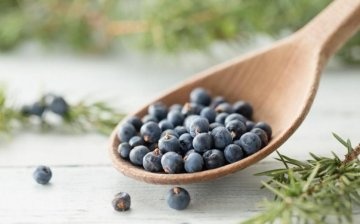
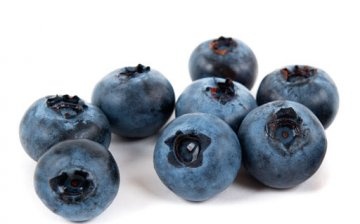
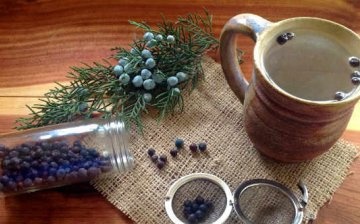
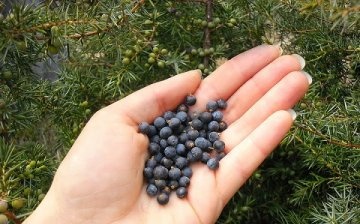
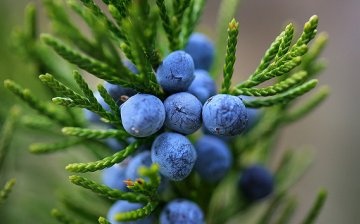





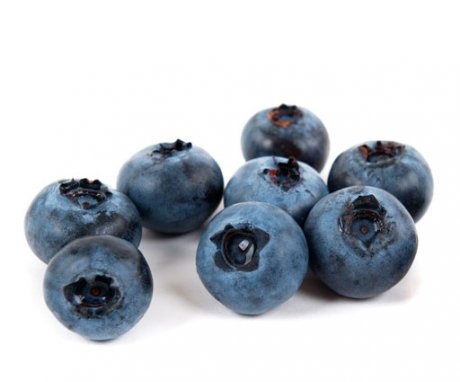
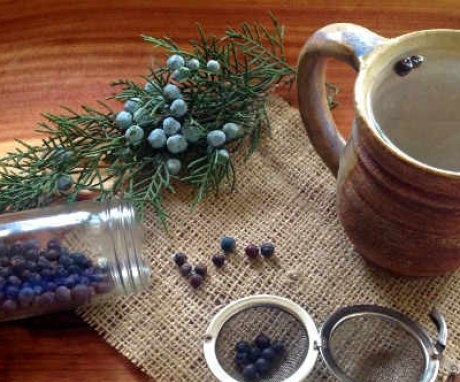
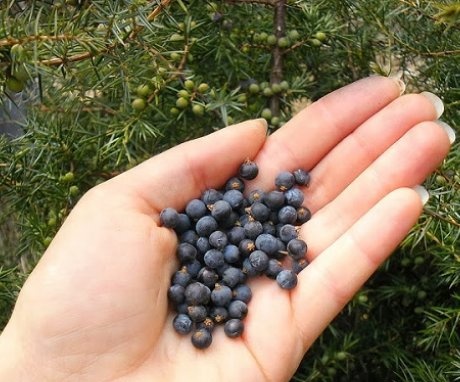
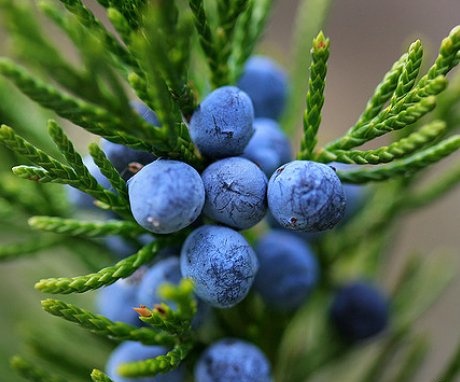
I saw a juniper many times, but I never knew that its berries can be eaten, I thought that it was an ornamental plant. I will definitely harvest and drink tea this year)))
In our region, only Cossack juniper grows, therefore, it cannot be used for medicinal purposes. True, I don't know, maybe its bark and young branches are not poisonous?